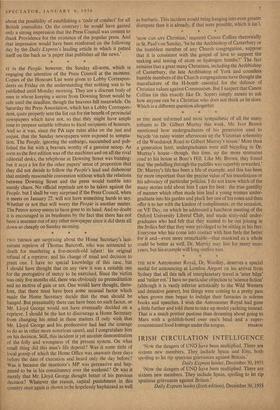TWO THINGS are surprising about the Home Secretary's last-. minute
reprieve of Thomas Bancroft, who was sentenced to death . for murdering a five-month-old infant : his original refusal of a reprieve; and his change of mind and decision to grant one. I have no special knowledge of this case, but I should have thought that on any view it was a suitable one for the prerogative of mercy to be exercised. Since the victim was only five months old, there was obviously no premeditation and no motive of gain or sex. One would have thought, there- fore, that there must have !Nen some unusual factor which made the Home Secretary decide that the man should be hanged. But presumably there can have been no such factor, or Mr. Lloyd George would not have eventually decided on a reprieve. I should be the last to discourage a Home Secretary from changing his mind in these matters (I only wish that Mr. Lloyd George and his predecessor had had the courage to do so in other more notorious cases), and I congratulate him on his decision. Still, this incident is yet another demonstration of the folly and wrongness of the present system. On what small thing did this man's life depend? Was it some tittle of ' local gossip of which the Home Office was unaware three days before the date of execution and heard only the day before? Was it because the murderer's MP was persuasive and hap- pened to be in his constituency over the weekend? Or was it merely that Mr. Lloyd. George thought better of his previous decision? Whatever the reason, capital punishment in this country once again is shown to be hopelessly haphazard as well as barbaric. This incident would bring hanging into even greater disrepute than it is already, if that were possible, which it isn't.


































 Previous page
Previous page